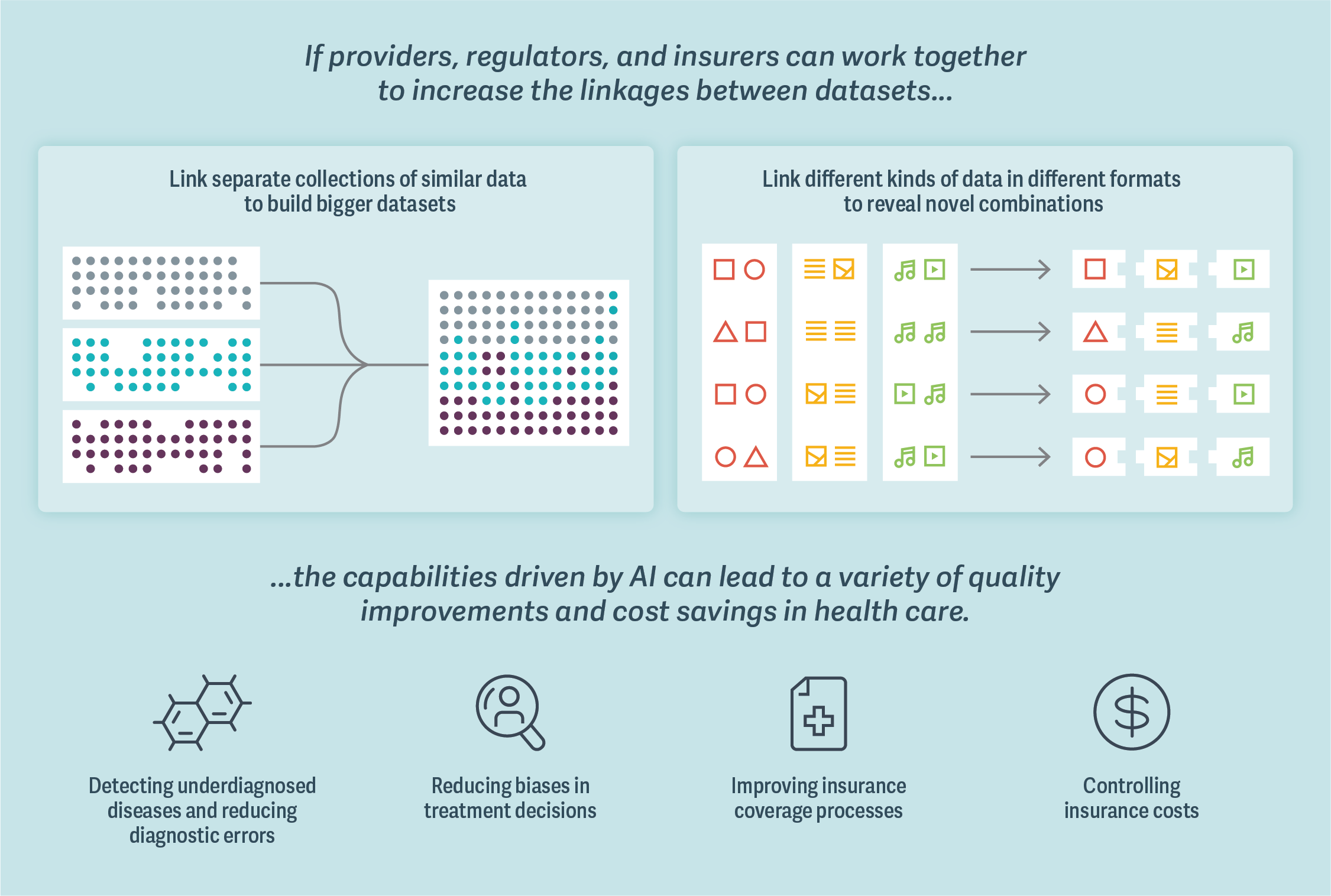-
Artificial Intelligence Can Open the Door to Better Learning, Better Care, and Better Coverage
In health care, newly developed artificial intelligence (AI) tools are opening the door to new diagnostic, research, and claims processing possibilities. (See figure.)
Click on the graphic below to open up an interactive version
As described in our article in PharmacoEconomics (see text box at the bottom of this page for full reference), AI tools can analyze the massive datasets created by combining claims data with data from other sources, such as census data, electronic medical record (EMR) systems, real-world evidence from clinical practice, and other patient information. Standard analytical methodologies can be overwhelmed by the size and complexity of such combined datasets. AI algorithms and systems, on the other hand, can be used to detect intricate and previously unrecognized patterns in the data.
Pooling Knowledge to Provide Better Care
The ability to combine various data sources gives researchers using AI tools access to a vast amount of medical knowledge, experience, and patient histories for particular conditions. Identification of novel patterns in previously untapped data of this sort can aid in:
- Finding new predictors for early onset of diseases
- Improving the detection of underdiagnosed or rare diseases
- Providing more accurate diagnoses
- Developing personalized treatments and preventive services
Identifying and Reducing the Effects of Biases
The greater knowledge and broader experience available from combined datasets can also help reduce bias in decision making. Bias may be introduced in a number of ways, such as a doctor having limited or incomplete information, or a physician’s over-reliance on his or her own experience.
By supplementing a physician’s experience and knowledge with a wealth of other information at the prescribing moment, AI tools can substantially increase that physician’s objectivity. AI applications are also being developed to address other inherent data biases, including “omitted variable bias.” (See text box at the bottom of this page for an example.)
Improving Insurance Coverage Processes and Fairness
AI can reduce costs at multiple stages of the insurance process: claim submission, claim adjudication, and fraud monitoring. For example, AI can increase the use of automation in the process for settling claims based on their complexity and known patient history, or can be used for early detection of abnormal price patterns or other warning signs.
If providers, regulators, and insurers can work together to increase the linkages between datasets, the capabilities driven by AI can lead to a variety of quality improvements and cost savings in health care. ■
-
Supplementing claims data with real-world evidence: An excerpt1
“The lack of lifestyle characteristics information is often cited as a main limitation of claims data. Information on how the recommended treatment was followed by the patient or the ‘quality of care’ may also be missing. The ability of AI to find complex patterns in the data can potentially approximate this missing information via combinations of the variables that are available. This can improve the matching of treated and untreated patients, which in turn helps correct for treatment selection biases in retrospective studies of treatment efficacy or safety.
For example, it is notoriously difficult to compare the effect of different treatments based on retrospective studies. The decision to prescribe one treatment over another is generally informed by a doctor’s evaluation, and the factors that affect that evaluation, such as the patient’s disease severity, other co-morbidities, and history of compliance, may be unobservable to the researcher. If, say, one treatment tends to be used for more severe cases, comparing its efficacy (or safety) against another treatment without controlling for this tendency will bias the results in favor of the treatment that is typically used for easier cases. … Recent research demonstrates that … the use of AI can significantly reduce, and essentially eliminate, such biases.”
1. From “Combining the Power of Artificial Intelligence with the Richness of Healthcare Claims Data: Opportunities and Challenges,” PharmacoEconomics, June 2019.
-
Nick Dadson, Vice President
Paul Greenberg, Managing Principal
Lisa Pinheiro, Managing Principal


